Chem133 week 7 - Study guides, Class notes & Summaries
Looking for the best study guides, study notes and summaries about Chem133 week 7? On this page you'll find 32 study documents about Chem133 week 7.
Page 2 out of 32 results
Sort by
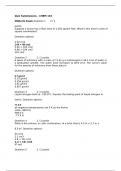
-
CHEM133 Week 7 Midterm Exam (March)
- Exam (elaborations) • 9 pages • 2023
- Available in package deal
-
- $32.99
- + learn more
1. Question: Suppose a house has a floor area of 2,250 square feet. What is this area in units of square centimeters? 2. Question: A piece of antimony with a mass of 17.41 g is submerged in 46.3 cm3 of water in a graduated cylinder. The water level increases to 48.9 cm3. The correct value for the density of antimony from these data is: 3. Question: Liquid nitrogen boils at –195.8°C. Express the boiling point of liquid nitrogen in kelvin. 4. Question: What is the volume, in cubic centimeter...
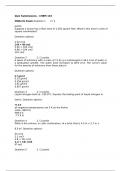
-
CHEM133 Week 7 Midterm Exam (March)
- Exam (elaborations) • 9 pages • 2023
- Available in package deal
-
- $39.99
- + learn more
1. Question: Suppose a house has a floor area of 2,250 square feet. What is this area in units of square centimeters? 2. Question: A piece of antimony with a mass of 17.41 g is submerged in 46.3 cm3 of water in a graduated cylinder. The water level increases to 48.9 cm3. The correct value for the density of antimony from these data is: 3. Question: Liquid nitrogen boils at –195.8°C. Express the boiling point of liquid nitrogen in kelvin. 4. Question: What is the volume, in cubic centimeter...
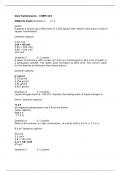
-
CHEM133 Week 7 Midterm Exam (March)
- Exam (elaborations) • 9 pages • 2023
-
- $31.49
- + learn more
1. Question: Suppose a house has a floor area of 2,250 square feet. What is this area in units of square centimeters? 2. Question: A piece of antimony with a mass of 17.41 g is submerged in 46.3 cm3 of water in a graduated cylinder. The water level increases to 48.9 cm3. The correct value for the density of antimony from these data is: 3. Question: Liquid nitrogen boils at –195.8°C. Express the boiling point of liquid nitrogen in kelvin. 4. Question: What is the volume, in cubic centimeter...
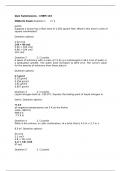
-
CHEM133 Week 7 Midterm Exam (March)
- Exam (elaborations) • 9 pages • 2023
-
- $30.49
- + learn more
1. Question: Suppose a house has a floor area of 2,250 square feet. What is this area in units of square centimeters? 2. Question: A piece of antimony with a mass of 17.41 g is submerged in 46.3 cm3 of water in a graduated cylinder. The water level increases to 48.9 cm3. The correct value for the density of antimony from these data is: 3. Question: Liquid nitrogen boils at –195.8°C. Express the boiling point of liquid nitrogen in kelvin. 4. Question: What is the volume, in cubic centimeter...
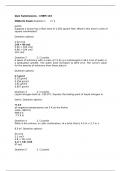
-
CHEM133 Week 7 Midterm Exam (All Correct)
- Exam (elaborations) • 9 pages • 2023
-
Available in package deal
-
- $35.48
- + learn more
1. Question: Suppose a house has a floor area of 2,250 square feet. What is this area in units of square centimeters? 2. Question: A piece of antimony with a mass of 17.41 g is submerged in 46.3 cm3 of water in a graduated cylinder. The water level increases to 48.9 cm3. The correct value for the density of antimony from these data is: 3. Question: Liquid nitrogen boils at –195.8°C. Express the boiling point of liquid nitrogen in kelvin. 4. Question: What is the volume, in cubic centimeter...
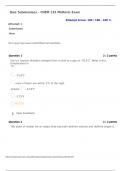
-
CHEM133 Week 7 Midterm Exam: 100% Score
- Exam (elaborations) • 26 pages • 2023
-
Available in package deal
-
- $45.15
- + learn more
1. Question: Dry ice (carbon dioxide) changes from a solid to a gas at –78.5°C. What is this temperature in °F? 2. Question: The state of matter for an object that has both definite volume and definite shape is 3. Question: In 1828, the diameter of the U.S. dime was changed to approximately 18 mm. What is this diameter when expressed in nanometers? 4. Question: A piece of antimony with a mass of 17.41 g is submerged in 46.3 cm3 of water in a graduated cylinder. The water level increases t...
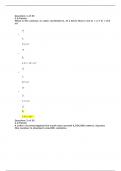
-
CHEM133 Week 7 Midterm Exam.
- Exam (elaborations) • 27 pages • 2023
-
- $39.49
- + learn more
1. Question: What is the volume, in cubic centimeters, of a brick that is 4.0 in × 2.7 in × 8.0 in? 2. Question: A sailor circumnavigated the earth and covered 4,264,000 meters. Express this number in standard scientific notation. 3. Question: The state of matter for an object that has both definite volume and definite shape is 4. Question: How many of the following numbers contain 3 significant figures? 5. Question: In the spring of 2008, gasoline cost £1.029 per Liter in London. On the ...
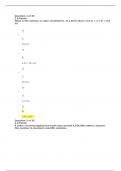
-
CHEM133 Week 7 Midterm Exam: 100% Score
- Exam (elaborations) • 27 pages • 2023
-
Available in package deal
-
- $47.76
- + learn more
1. Question: What is the volume, in cubic centimeters, of a brick that is 4.0 in × 2.7 in × 8.0 in? 2. Question: A sailor circumnavigated the earth and covered 4,264,000 meters. Express this number in standard scientific notation. 3. Question: The state of matter for an object that has both definite volume and definite shape is 4. Question: How many of the following numbers contain 3 significant figures? 5. Question: In the spring of 2008, gasoline cost £1.029 per Liter in London. On the ...
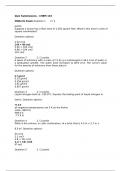
-
CHEM133 Week 7 Midterm Exam: 100% Score
- Exam (elaborations) • 9 pages • 2023
-
Available in package deal
-
- $45.15
- + learn more
1. Question: Suppose a house has a floor area of 2,250 square feet. What is this area in units of square centimeters? 2. Question: A piece of antimony with a mass of 17.41 g is submerged in 46.3 cm3 of water in a graduated cylinder. The water level increases to 48.9 cm3. The correct value for the density of antimony from these data is: 3. Question: Liquid nitrogen boils at –195.8°C. Express the boiling point of liquid nitrogen in kelvin. 4. Question: What is the volume, in cubic centimeter...
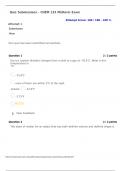
-
CHEM133 Week 7 Midterm Exam (Spring)
- Exam (elaborations) • 26 pages • 2023
-
- $21.49
- + learn more
1. Question: Dry ice (carbon dioxide) changes from a solid to a gas at –78.5°C. What is this temperature in °F? 2. Question: The state of matter for an object that has both definite volume and definite shape is 3. Question: In 1828, the diameter of the U.S. dime was changed to approximately 18 mm. What is this diameter when expressed in nanometers? 4. Question: A piece of antimony with a mass of 17.41 g is submerged in 46.3 cm3 of water in a graduated cylinder. The water level increases t...

How much did you already spend on Stuvia? Imagine there are plenty more of you out there paying for study notes, but this time YOU are the seller. Ka-ching! Discover all about earning on Stuvia


